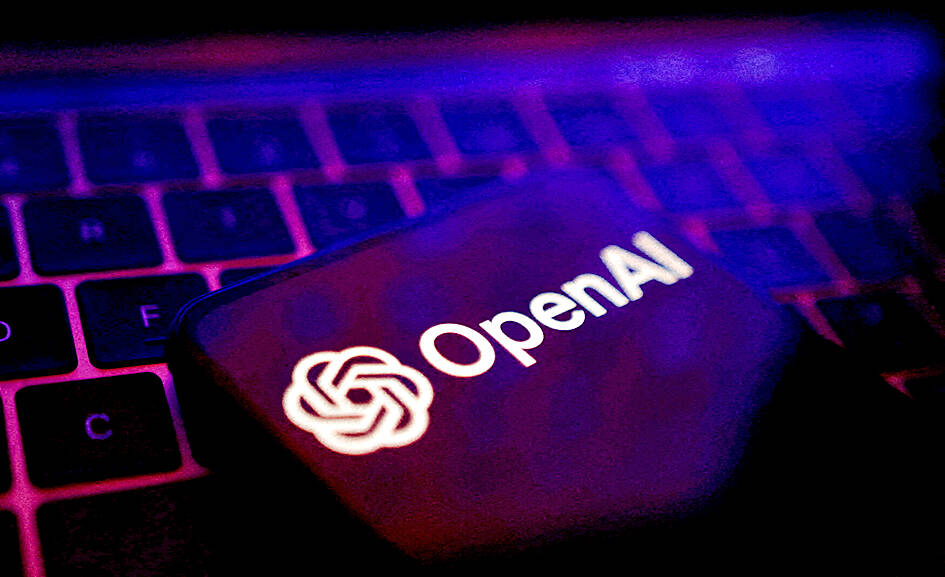Digital news units of Indian billionaires Gautam Adani and Mukesh Ambani, and other outlets including the Indian Express and the Hindustan Times, are joining proceedings against OpenAI for improperly using copyright content, legal papers show.
The Indian media outlets, including Adani’s NDTV and Ambani’s Network18, have told a New Delhi court they want to join an ongoing lawsuit against the ChatGPT creator as they are worried their news Web sites are being scraped to store and reproduce their work for users of the powerful artificial intelligence (AI) tool.
In the most high-profile battle, local news agency ANI was the first to file a lawsuit against OpenAI last year. Global and Indian book publishers joined on Friday.

Photo: Reuters
The 135-page case filing, which is not public, but was reviewed by Reuters, argues OpenAI’s conduct constitutes “a clear and present danger to the valuable copyrights” of Digital News Publishers Association (DNPA) members and other outlets.
It refers to OpenAI’s “willful scraping ... and adaptation of content,” adding that “the disproportionate power of tech companies in prioritizing content and extracting advertising revenue has raised concerns among publishers.”
The filing was made by the Indian Express, Hindustan Times, Adani’s NDTV and the DNPA, which represents about 20 companies including Mukesh Ambani Network18 and players like Hindi daily Dainik Bhaskar, Zee News, India Today Group and The Hindu. Many of these outlets have a flourishing newspaper and television news business too.
The Times of India is not part of the legal challenge despite being a member of the DNPA, the filing said, without elaborating on the reasons.
OpenAI did not respond to a request for comment on the allegations made by the Indian news outlets. It has repeatedly denied such allegations, saying its AI systems make fair use of publicly available data.
In the US, the New York Times sued OpenAI and its largest financial backer Microsoft Corp in December 2023, accusing them of using millions of its articles without permission to train chatbots to provide information to users.
The new Indian intervention would add firepower to ANI’s lawsuit against OpenAI in India’s most high-profile legal proceedings on the issue.
A hearing in ANI’s lawsuit against OpenAI is scheduled for today.
Responding to the ANI case, OpenAI last week said that any order to delete training data would result in a violation of its US legal obligations, and Indian judges have no jurisdiction to hear a copyright case against the company as its servers are located abroad.
Reuters, which holds a 26 percent interest in ANI, has said it is not involved in ANI’s business practices or operations.
In recent months, OpenAI has signed deals with Time magazine, the Financial Times, Business Insider-owner Axel Springer, France’s Le Monde and Spain’s Prisa Media to display content.
The Indian publishers in their new filing argue that OpenAI has entered into partnership agreements with media outlets abroad, but has not entered into similar deals in India, hurting the media companies.
Such conduct by OpenAI “in India betrays an inexplicable defiance of the law,” the Indian media outlets’ filing said.
As OpenAI is set to become a profit-driven business benefiting from the creative works of the media industry, it would result in a “weakened press” and would not be in the best interests of a vibrant democracy, their filing said.

In Italy’s storied gold-making hubs, jewelers are reworking their designs to trim gold content as they race to blunt the effect of record prices and appeal to shoppers watching their budgets. Gold prices hit a record high on Thursday, surging near US$5,600 an ounce, more than double a year ago as geopolitical concerns and jitters over trade pushed investors toward the safe-haven asset. The rally is putting undue pressure on small artisans as they face mounting demands from customers, including international brands, to produce cheaper items, from signature pieces to wedding rings, according to interviews with four independent jewelers in Italy’s main

Macronix International Co (旺宏), the world’s biggest NOR flash memory supplier, yesterday said it would spend NT$22 billion (US$699.1 million) on capacity expansion this year to increase its production of mid-to-low-density memory chips as the world’s major memorychip suppliers are phasing out the market. The company said its planned capital expenditures are about 11 times higher than the NT$1.8 billion it spent on new facilities and equipment last year. A majority of this year’s outlay would be allocated to step up capacity of multi-level cell (MLC) NAND flash memory chips, which are used in embedded multimedia cards (eMMC), a managed

Japanese Prime Minister Sanae Takaichi has talked up the benefits of a weaker yen in a campaign speech, adopting a tone at odds with her finance ministry, which has refused to rule out any options to counter excessive foreign exchange volatility. Takaichi later softened her stance, saying she did not have a preference for the yen’s direction. “People say the weak yen is bad right now, but for export industries, it’s a major opportunity,” Takaichi said on Saturday at a rally for Liberal Democratic Party candidate Daishiro Yamagiwa in Kanagawa Prefecture ahead of a snap election on Sunday. “Whether it’s selling food or

In the wake of strong global demand for AI applications, Taiwan’s export-oriented economy accelerated with the composite index of economic indicators flashing the first “red” light in December for one year, indicating the economy is in booming mode, the National Development Council (NDC) said yesterday. Moreover, the index of leading indicators, which gauges the potential state of the economy over the next six months, also moved higher in December amid growing optimism over the outlook, the NDC said. In December, the index of economic indicators rose one point from a month earlier to 38, at the lower end of the “red” light.